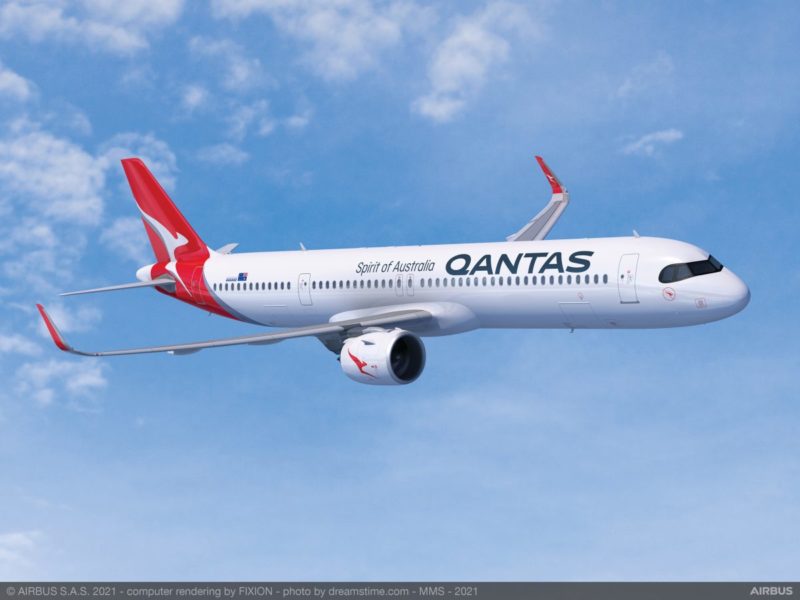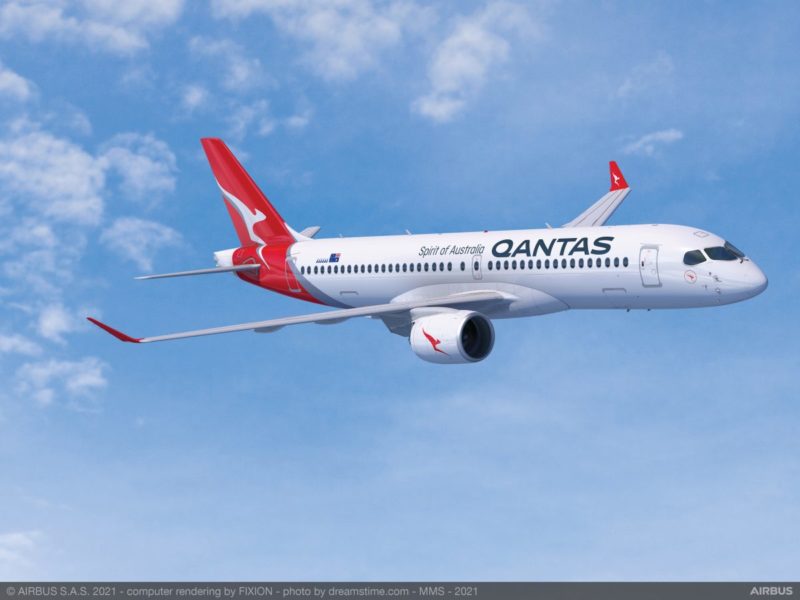In a major announcement, Qantas is planning a major switch from Boeing to Airbus, with the airline selecting the Airbus A320neo and Airbus A220 families as the preferred aircraft for the long-term renewal of its domestic narrow-body fleet.
The airline has made a firm commitment for 40 aircraft – 20 A321XLR (extra long-range) and 20 A220-300 aircraft.

Qantas Airbus A321XLR – Rendering, Qantas

Qantas Airbus A220-300, Rendering Qantas
Qantas expects the order to be placed with Airbus by the end of Financial Year 22. The move follows discussions with employees about arrangements to operate the new aircraft types and a final decision by the Qantas Board.
More importantly, Qantas has secured a further 94 purchase right options on aircraft over a 10-plus year delivery window. With a backlog as large as that, the renewal will target the existing Boeing 737-800s and 717s – these aircraft will be gradually phased out.
The order is in addition to Jetstar’s existing agreement with Airbus for over 100 aircraft in the A320neo family. Part of this new deal includes combining these two orders so that the Group can draw down on a total of 299 deliveries across both the A320 and A220 families as needed over the next decade and beyond for Qantas, QantasLink and Jetstar.
There was competition, with the airline comparing A320neo and B737 MAX families as well as the smaller A220 and Embraer E190/195-E2s, with its divisions(engineering, flight operations, customer experience, network, fleet procurement and finance teams) all evaluating the types.
The A321XLR can carry 15% more passengers than the existing Boeing 737-800 aircraft in the fleet, with the operational flexibility to operate them on both domestic and long haul routes. Meanwhile, the A220-300 can target the smaller domestic and regional operations, as well as on trunk routes during off-peak times.
In Quotes
Qantas Group CEO Alan Joyce said the airline had called the renewal of its domestic fleet Project Winton after the town where the national carrier was born 101 years ago because it’s a key strategic decision for the future of Qantas Domestic.
“This is a long-term renewal plan with deliveries and payments spread over the next decade and beyond, but the similarly long lead time for aircraft orders means we need to make these decisions now.
“Qantas is in a position to make these commitments because of the way we’ve navigated through the pandemic, which is a credit to the whole organization.
“This is a clear sign of our confidence in the future and we’ve locked in pricing just ahead of what’s likely to be a big uptick in demand for next-generation narrow-body aircraft. That’s good news for our customers, our people and our shareholders.
“We’ll be having discussions with our people to ensure we have the arrangements necessary to support such a large investment.
“Can I thank Airbus, Boeing, Embraer and the engine manufacturers for the efforts they put into this process. This was a very tough choice to make. Each option delivered on our core requirements around safety, capability and emissions reductions. But when you multiply even small benefits in areas like range or cost across this many aircraft and over the 20 years they’ll be in the fleet, Airbus was the right choice as preferred tenderer.
“The Airbus deal had the added advantage of providing ongoing flexibility within the order, meaning we can continue to choose between the entire A320neo and A220 families depending on our changing needs in the years ahead. The ability to combine the Jetstar and Qantas order for the A320 type was also a factor.
“The A320 will be new for Qantas Domestic, but we already know it’s a great aircraft because it’s been the backbone of Jetstar’s success for more than 15 years and more recently operating the resources industry in Western Australia.
“The A220 is such a versatile aircraft which has become popular with airline customers in the United States and Europe because it has the capability to fly regional routes as well as longer sectors between capital cities.
“The combination of small, medium and large jets and the different range and economics they each bring means we can have the right aircraft on the right route.w
“For customers, that means having more departures throughout the day on a smaller aircraft, or extra capacity at peak times with a larger aircraft. Or the ability to start a new regional route because the economics of the aircraft make it possible.
“We have some exciting plans for the next-generation cabins we’ll put on these aircraft, which will offer improvements for passengers that we’ll share in coming months.
“Importantly, these aircraft will deliver a step change in reducing fuel burn and carbon emissions compared with our current fleet, which gets us closer to the net zero target we’ve set,” added Mr Joyce.
A change for Qantas and a blow to Boeing
It seems that Qantas has chosen to turn away from Boeing as it has used its experience with the Airbus narrow-body aircraft with Jetstar to help form its opinion of how it wants to operate its domestic programme.
The airline has been a heavy user of the Boeing types in the past – but it seems the airline is choosing a different direction compared to the path it has trodden before (with the airline using Boeing 737 and 767s).
Of course, there are lots of questions to be answered on how the aircraft will be configured. This will ultimately dictate the passenger experience aboard the aircraft.
That could be the real interesting part.
Welcome to Economy Class and Beyond – Your no-nonsense guide to network news, honest reviews, featuring in-depth coverage, unique research, as well as the humour and madness as I only know how to deliver.
Follow me on Twitter at @EconomyBeyond for the latest updates! You can follow me on Instagram too!
Also remember that we are part of the BoardingArea community, bringing you the latest frequent flyer news from around the world.
Airbus’ ability to offer the A220 and A320 families together like this is a huge one and something Boeing has no answer for. Add to that the A321XLR’s capabilities and (from what I’ve seen, at least) customers’ preference for the A320 series over the 737MAX and Boeing is in a position where they either have to discount deeply or lose orders.
No sympathy, really…the problems with not doing a much more substantial design update (or a clean-sheet 737 replacement) are their own fault. Can’t help but think part of it is the need to cater to Southwest’s “one fleet type” mentality.
I will not use or recommend Qantas in the future. Their lack of loyalty to Boeing is amazing.